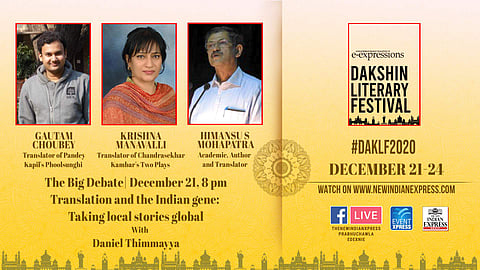

Translation is a creative process and the process should be referred as transcreation, says Krishna Manavalli, who translated Kannada plays by Chandrasekhar Kambar. Even though there are some things that might get lost, it has now become a cliche, adds Delhi University professor Gautam Choubey, who translated Bhojpuri novel Phoolsunghi, which is the first Bhojpuri novel translated into English. They, along with author and translator Himansu S Mohapatra, were in conversation with Daniel Thimmayya, Chief Reporter, Edex as part of DakLF on The New Indian Express' webcast e-expressions.
Referring to her act and process of translation and what she finds challenging, Manavalli says, "What is more challenging for me is to retain the rhythm and musicality of the language being translated from. I am not an ethnographer, but a translator. I am not documenting. I try to steer clear of the orientalist approach and avoid giving an exhaustive glossary to region-specific terms. Instead, I try to bring them in the text." Speaking about his process of translation, Choubey says, "While translating Phoolsunghi, I had to introduce certain objects and rituals in regional languages and then find equivalent words and ideas that were not so region-specific."
Answering a question about the difference of approach to commercial and academic translation and why she chose to translate in the first place, Manavalli states, "Academic and commercial translations are tied together to a very large extent. Working in various locations has made me aware of how translations work in the academic field. In some subjects, there are established canons and only a few Indian writers writing in English and very few translated authors receive the global limelight. But what happens who come from South India or other areas in India? Indian literature is often discussed in academic circles in the US but the rich diversity, the corpus of literature in regional languages remains absent. So how do you bring that to global visibility? These questions got me thinking and made me want to translate Kambar's works."
Speaking about his Bhojpuri heritage and how his translation of Phoolsunghi brought Bhojpuri literature to the forefront, Choubey says, "My maternal grandfather was a Bhojpuri writer of some repute. His were the stories I grew up listening to with but I never got to read them as much. But when I finished my PhD from Delhi University, someone thrust a copy of Phoolsunghi in my hand and asked me to translate it. I had some trouble reading after the first few pages as I had never read Bhojpuri as much. Literary Bhojpuri is quite different than the Bhojpuri I grew up speaking. Eventually, I started connecting with Bhojpuri authors and critics. When I first posted the cover of my book on Facebook, I realised that the Bhojpuri literature diaspora extends beyond the academics, linguists or activists but also encompasses farmers and migrant labourers."
Mohapatra, who translated the Odia serialised 1930s novel Basanti and also works by Jagadish Mohanty, narrates the challenges of bringing the novel from the past and make it suitable for a modern audience. "Jagadish Mohanty, whose work I translated, is a modern author who wrote mostly about mining in western Odisha. The novel is, however, not merely an industrial novel and just about the workers and their issues. It is about existentialism and man's quest for meaning in a world he is a stranger to. So this novel is an amalgamation of a coal field setting, existentialism from western literature and Gandhian principles. In the end, we get a very unique novel in Indian literature," Mohapatra says.
But do translated works have a market? Manavalli says, "Interestingly, when I was done with two plays and we were planning to launch the book, the first lockdown was announced. We had to rethink our marketing strategies for the book. And even though we couldn't launch the book physically, we saw so much publicity and an avalanche of reviews pouring in from all online and print media. So many readers spoke to us directly. This got me thinking and boosted my courage that even during the pandemic, translations that I had worked on reached a lot of people. Translation has a central place in the literary market and the way people are receiving it is very very heartening."
